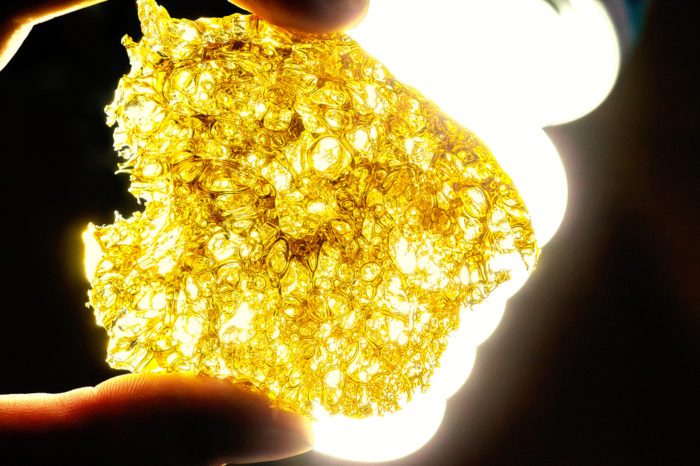Easily made and readily absorbed, THC syrup is a versatile way to medicate.
The sheer amount of ways to consume cannabis is what sets it apart. While most smoke, vape, or dab, it’s in the world of edibles and beverages where an enthusiast can really get creative. THC syrup is one way to enhance your culinary repertoire and open up a whole new cannabis experience.
What is THC Syrup?
Simply put, it’s a sweet cannabis-infused syrup that is fine to consume alone, in drinks, or even on food.
THC syrup is popular for its quick onset times. This is due to the fact that the THC arrives into the body in liquid form. This means that assimilation is not limited by how quickly absorption takes place in the gastric fluids as is the case with edibles. As a result, patients commonly notice the effects come on between fifteen and twenty minutes after administration.
How to Make THC Syrup
THC Syrup is easily made at home with a few simple ingredients.
Here’s what you’ll need:
- 0.75 liters (three cups) of filtered water
- Three cups of fine granulated sugar
- Two tablespoons of vegetable glycerine
- Two grams of decarboxylated cannabis flower OR an equivalent amount from an extract
- A saucepan
- A cheesecloth (if using cannabis flower)
The process is greatly simplified by using a concentrate. But for those using cannabis flower, then decarboxylation is an important step. It converts THCa — the acid form of THC — into active THC. To decarboxylate, place the ground bud on a tray and place it in the oven at two hundred and forty degrees Fahrenheit for thirty minutes.

THC Syrup Recipe
To begin, bring the water to the boil and add the sugar. Once all of the sugar has dissolved, add either the decarboxylated cannabis or your extract to the solution. Allow it to simmer for a further thirty minutes before adding the vegetable glycerine. Let the solution simmer for a further ten minutes and voila!
Strain your mixture through a cheesecloth if you’ve used cannabis flower, repeating until there is no plant matter in the final product.
THC Syrup and THC Lean: What’s the Difference?
THC syrup shouldn’t be confused with THC lean. The latter is based on what is known as “purple dank” — a sugary drink mixed with the opiate codeine. Essentially a clever term for an opiate buzz, THC lean contains both THC and codeine.
Due to the addictive nature of codeine, and the fact that it is a potent pharmaceutical-grade chemical, the consumption of THC lean is not recommended. THC syrup doesn’t contain codeine, and therefore no addictive opiates.
Although there is an important distinction between each, many still continue to use either term interchangeably. They assume that THC lean does not contain codeine and see no difference between the THC lean and THC syrup.
Storing Simple Syrup
Sugar acts as a fairly good preservative in foods. So when prepared and stored properly, THC syrup can last for a considerable amount of time. Molds can quickly form so it is essential that your syrup is stored in a sterile container in the refrigerator.
If you’ve followed the above recipe correctly, then you can expect the syrup to last for approximately one month. For those who prefer to make a longer-lasting batch then just try adding more sugar to the original mix. A two to one ratio may extend it up to six months.

The Uses of THC Syrup
From dessert toppings to the base for any beverage, there are a plethora of uses for THC syrup.
Its syrupy taste and texture mean it combines well with many sweet dishes and makes a great addition to pancakes. For those who want to incorporate it into a savory dish, try it in a barbecue sauce.
It’s perhaps with beverages where THC syrup may be most useful. The presence of THC makes the syrup a perfect ingredient in a non-alcoholic beverage. While on a warm summer’s day, some syrup added to some sparkling water and fruit juice provides a refreshing treat.
THC syrup can also be consumed alone. And it’s those feeling under the weather who often consume it for colds and cases of flu. A study published by the International Cannabinoid Research Society (2016), discussed the anti-inflammatory effects of many cannabis compounds. In illnesses as simple as the common cold, the associated symptoms of inflamed sinuses, tension headaches, and puffy eyes are all due to inflammation. Some sweet THC syrup always helps the medicine go down and help with that underlying inflammation.
Dosage
THC tolerances vary widely and patients may require very different doses for similar effects. Inexperienced patients should begin with five to ten milligrams and work up.
Those who follow the above recipe can calculate the dose by dividing the total weight of the solution by the total amount of THC present (in milligrams). This is very easily calculated if a concentrate was part of the recipe. In cases where flower is the cannabis source, find the typical THC percentage of the cultivar to obtain a rough calculation.
With a full jug of syrup in the fridge, patients are never stuck. With such varied potential consumption methods, medicine can now come in many forms.






Branka Lewis
With all that sugar not exactly good for the cancer patients.
Gary B
hmmm…looks like I found a new sweetener for my morning coffee.
Andrew Cox
Granulated sugar is DEADLY – it feeds cancer. What an irresponsible article. Substitute sugar with Stevia Rubiana extract and you will have the same product but totally safe.
Patricia Cotton
That’s a lot of sugar for a diabetic with the flu. Any suggestions?